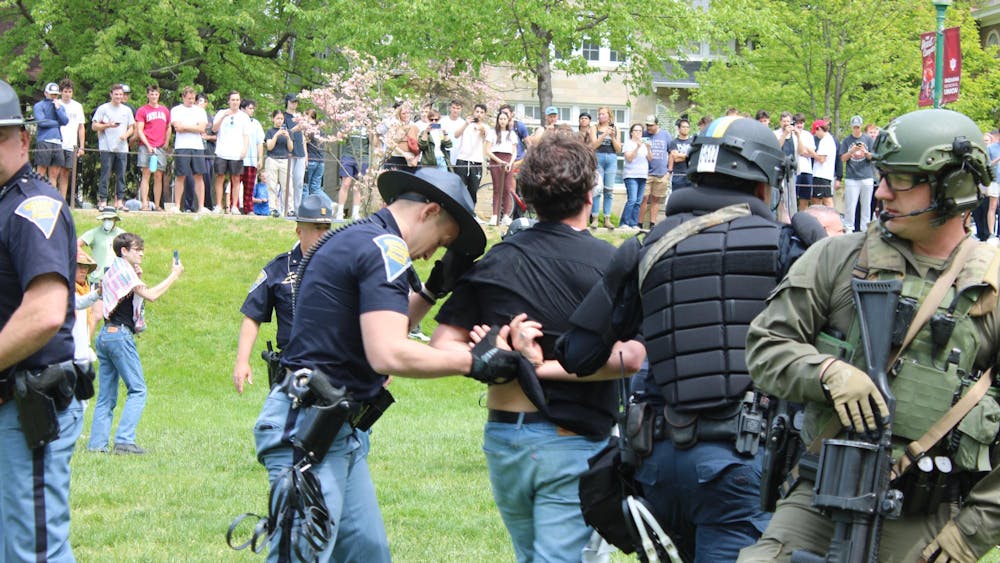VALPARAISO — None of Dustin McCowan’s DNA was found on the body of his murdered ex-girlfriend, Amanda Bach. None of his fingerprints were discovered inside her abandoned car or at the railroad tracks where body was dumped. The gun that was used to shoot her in the neck was never recovered.
Despite a lack of any physical evidence definitively placing him at the murder scene, McCowan, a 20-year-old from Union Township, was sentenced Thursday to 60 years in prison.
Last month, a jury unanimously found McCowan guilty of first-degree murder. He was arrested for that crime on the IU campus after Bach’s body was found near train tracks almost 300 yards from McCowan’s home. One eyewitness testified that he had seen McCowan the night of the murder near where Bach’s body was found. A cellmate also testified that McCowan made incriminating comments in jail.
At Thursday’s sentencing, the emotions burst inside the courtroom. The victim’s family hurled insults at McCowan and his family, calling the defendant a “coward” and a “sociopath.” Family members stormed out of the room in anger, causing Porter County Superior Court Judge Bill Alexa to silence the room twice to restore order.
Bach’s mother glared at McCowan and his father as she snarled at them, mocking the convicted man. A prosecuting attorney called the McCowan family “pathetic.”
For most of the hearing, McCowan kept his head down. When asked by Judge Alexa if he had anything to say, the defendant mumbled under his breath. The judge asked him to speak up.
“No,” McCowan said. “I don’t think the court deserves it, your honor.”
***
The emotional sentencing was the latest episode in a case that has stunned
Northwest Indiana since Bach’s body was discovered last September.
That evening, the 19-year-old woman had been at McCowan’s home watching movies and playing Playstation 3. McCowan told detectives his ex-girlfriend left at about 1:30 a.m.
At 3:23 a.m., her 2006 Pontiac was found in the parking lot of a nearby convenience store. The driver’s seat had been pushed back to accommodate “a guy or larger person,” according to court documents. Bach was petite: She stood at five feet, two inches tall and weighed only 105 pounds. McCowan is six-foot two and 175 pounds.
After being interviewed by police about his missing ex-girlfriend, McCowan drove to Bloomington the next day to go to an IU football game with friends. He said he’d take a shot of alcohol in her honor, according to court documents.
Late the next afternoon, her body was found 294 yards from McCowan’s house.
She was lying on her back, stripped down to her underwear. Her left leg curled awkwardly behind her. The right leg was flat but bent, with the knee splayed out. Five shirts and a bra were wrapped around her right hand.
Police reported that there was no evidence of a sexual assault. Bach’s cellphone was never found.
McCowan’s father, a Crown Point, Ind., police officer, told police he owns a 38-caliber handgun, but it was missing from his home. A similar gun was used to kill Bach, prosecutors say. At the time of the murder, McCowan was living with his parents.
During the trial, a neighbor of the McCowan family testified that on the night Bach went missing, she heard a man say “Amanda get up, come on, Amanda, get up, Amanda, get up.” Court documents say she also heard a female voice say, “I can’t believe this is happening.”
One of McCowan’s cellmates testified that McCowan had bragged about killing a girl named “Amanda” and burying the gun “so good nobody would ever find it.”
Porter County police have said they will begin investigating McCowan’s father, Joseph McCowan for helping his son cover up the crime.
During the trial, one eyewitness testified that he saw McCowan while driving by the train tracks that night.
Several of McCowan’s friends testified that they had heard him threatening Bach in the weeks before the murder. They told the jury that McCowan thought that Bach was pregnant, saying to a friend that if that was true, “I’m gonna have to kill her.”
***
Deputy Prosecutor Cheryl Polarek argued for the maximum sentence of 65 years. Wearing a pink bracelet on her left hand — pink was Bach’s favorite color — the prosecutor talked about how Bach was well-liked and known for her friendly smile and memorable laugh.
Pink ties, pink scarves, pink shirts, pink ribbons, pink bracelets dotted the prosecutor’s side of the courtroom. Photos of Amanda in a pink top rested on the railing behind the prosecution’s table.
The McCowan family filled the side of the courtroom behind the defense. Joseph McCowan, currently under investigation on suspicion of helping cover up Bach’s murder, sat in the front row closest to the wall.
The prosecutor turned her attention to McCowan’s family.
“Dustin McCowan is the way he is because of the adults in his life,” she said. “They are dishonest, cowardly and pathetic.”
At this, someone on the McCowan side of the courtroom scoffed and stood up, storming toward the center aisle. Sheriff’s deputies blocked the Bach side of the courtroom and allowed the woman to exit the courtroom in frustration.
Judge Alexa stopped Polarek and pointed a finger at the McCowans. He threatened them with five days in jail for contempt if there was another outburst from that side of the courtroom.
“I do not want to see anything like that again,” he said.
The prosecutor continued, saying McCowan had a history of substance abuse, including drinking starting at age 16 and smoking marijuana occasionally starting at age 16 or 17. McCowan was known for having parties with alcohol when his parents were not at home.
“Witnesses testified that they took the trash,” she said, “and threw it by the railroad tracks near where Amanda’s body was found.”
When defense attorney John Vouga stood to speak, he argued not only for the minimum sentence, but also defended the McCowan family.
“I’m not going to stoop to levels of name calling. I’m not going to do that,” he said. “Just as the prosecution are getting to know the Bach family, we’ve gotten to know the McCowan family.”
Throughout the trial, Vouga had insisted that McGowan was innocent, and during the sentencing hearing, Vouga called it a “strictly circumstantial case.”
“After 25 years, I’ve had so many jury trials I can’t even count,” Vouga said after the hearing. “In a trial when there is absolutely no DNA evidence, no trace fiber evidence, no fingerprint evidence, nine out of 10 times an unbiased jury will find him not guilty.”
When William Bach, Amanda’s father, took the witness stand to read a letter to the court, his hands were shaking. He had brought a photo of Amanda in a plastic frame to the stand with him.
“Because of Dustin McCowan’s cowardly actions, I will not see many milestones with my daughter Amanda,” he said. “Now I will not be able to walk her down the aisle.”
McCowan was looking down, clenching and unclenching his teeth.
“It’s devastating to take one less plate out for dinner and see the place where she would have sat,” William Bach said. “I pray that one day he’ll tell the truth and beg forgiveness, but it takes a man to do that.”
Sandy Bach, Amanda’s mother, demanded that McCowan look up and pay attention as she spoke.
“I will not let you get the best of me, Dustin McCowan, I will not,” she said. “Oh, you can’t even look at me, can you?”
As she described her daughter, she broke into tears. The judge stopped her, asking if she would like someone else to read the letter.
“No,” she said. “I have to do this.”
She continued, her hands shaking lightly as she read about how Amanda always enjoyed helping people. She wanted to be a nurse.
“But because of the way she left this world, even that was taken from her,” Sandy Bach said. “I will not let you get the best of me, Dustin McCowan, I will not. You don’t like hearing that, do you?”
She called him a “selfish...sociopath of a man” and an “arrogant, idiotic young punk.” Once, she let slip, “Dustin McCoward.”
She began to attack other members of the McCowan family, when Judge Alexa made her stop. The purpose of a victim impact statement, he said, was to talk about the sentence itself, not attack the convicted.
“Go back to your seat,” he said. “Can I just skip over all of that?” she asked.
He conceded and she continued.
The death penalty was too easy, she said, an easy way out. She requested the maximum possible sentence in prison.
“I can’t let the way he hurt my family rule how I’m going to live my life,” she said after the hearing. “This isn’t about Dustin McCowan, it’s about Amanda Bach.”
***
Before the judge announced his sentence, he noted allegations that McCowan had been violent toward other women in the past. Although he had blocked those allegations from the trial, he considered them in deciding the punishment.
McCowan was accused of once grabbing a girl by the shoulders and shaking her violently because he was angry. Another time, he was accused of pushing a girl down the stairs, letting her fall into the basement. He was never charged in either case.
Whispers of “yes” and “should’ve been more” escaped from the Bach side of the courtroom as the judge read the sentence. The McCowans looked forward with red eyes and Kleenex in hand.
After appointing a public defender to appeal the case at McCowan’s request, Alexa ordered McCowan out of the courtroom.
“We’re finished with him,” the judge said. “We’re done.”
McCowan sentenced for Bach murder

Get stories like this in your inbox
Subscribe





